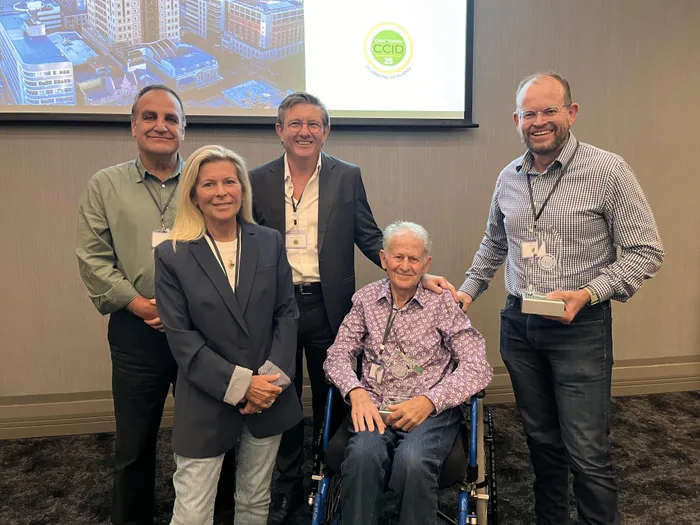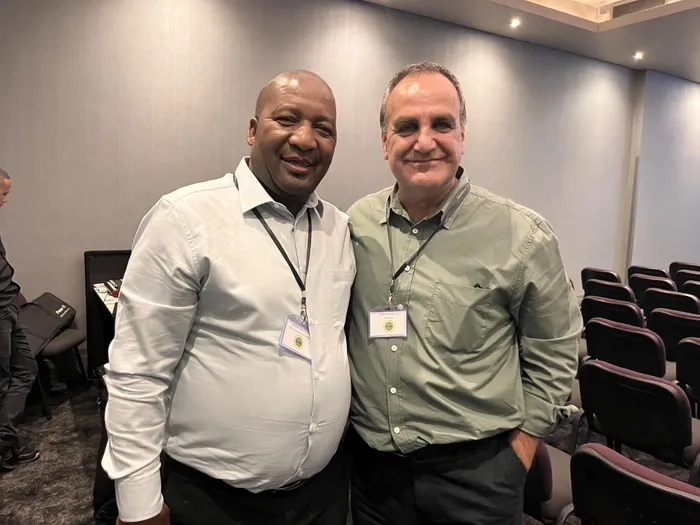Celebrating 25 years of success: the CCID's impact on Cape Town

Cape Town Central City Improvement District (CCID) board members, with chief executive officer Tasso Evangelinos, pictured at the back, from left, are board chairman Rob Kane and member Riaan van Wyk. In front are members Tamra Capstick-Dale and Julian Leibman.
Image: Fouzia van der Fort
The Cape Town Central City Improvement District (CCID) celebrated its 25th anniversary, marking a quarter-century of successful public-private partnership that has revitalised the central business district.
This milestone celebration coincided with their annual general meeting at a hotel in the city centre on Monday, November 17.
The CCID was founded in 2000 to combat urban decay and crime.
With the leadership of Rob Kane and chief executive officer Tasso Evangelinos, the CCID has transformed the 1.6 square-kilometer area into a vibrant, safe, and economically dynamic hub.
They celebrated more people choosing to live and work in the city, post-COVID, with the office vacancy rate plummeting.
Mayor Geordin Hill-Lewis highlighted the CCID as a model partnership, citing joint successes like clearing homeless encampments and deploying dedicated law enforcement.
"It's acknowledging a partnership that has proven time and time again what is possible when government and the private sector work together properly.
"With a shared mission, and a shared commitment to excellence and a proper hand-in-hand relationship," he said. He said that the CCID worked tirelessly to bring visible, effective improvement to the inner city, which has become one of the finest examples of a public-private partnership in South Africa.
"A clean, safe, vibrant inner city is not a luxury. It is a necessity for Cape Town's long-term success.
"It is the foundation upon which we will continue to build what we call a city of hope for all, which is our mission in Cape Town," he said.
Mr Kane shared some lessons learned during his tenure with the CCID.
These include perseverance, long-term goals, which require a lot of grit, focus, and discipline; learning to say no; investing in yourself; having passion; fostering innovation; paying attention to detail; being courageous; being prepared to fail; and surrounding yourself with good people.

Longest serving CCID social development department member, Headman Sirala-Rala, from Eerste River, auxiliary social worker, retires at the end of February, after 16 years of service. With him is CCID chief executive officer Tasso Evangelinos.
Image: Fouzia van der Fort
Mr Evangelinos reflected on the CCID's journey and key initiatives.
Since 2009, the CCID has leveraged a programme to hire dedicated law enforcement officers, starting with four and growing to 16, and six dedicated traffic officers.
They approached the City of Cape Town with a list of 10 000 road defects, which the municipality could not fix at the time.
They established a road maintenance team in 2009 and, with the City supplying materials, have since fixed 25 000 defects, 15 years later.
In early 2002, while fielding mostly security-related complaints, the CCID dug deeper, which showed that nearly 80 percent were anti-social and homeless-related.
This prompted the CCID to expand its mandate.
They introduced social fieldwork service in 2004, initially reporting to security, and later created a formal, dedicated budget for a social development department in 2008, with four social field workers, making a positive impact on the homeless community.
The CCID has since employed the services of Straatwerk, starting with four people at R4 500 per month, in 2004, for additional cleaning, litter picking, and hotspot cleaning. Today, they employ 250 to 300 people.
In 2016, the CCID became the first CID to introduce body-worn camera (BWC), a wearable audio, video, or photographic recording device typically worn by law enforcement officers to record their interactions with the public, for all public safety officers.
"This was a game-changer, dramatically reducing complaints against officers to almost zero. "Today, all 327 officers carry them," he said.
Mr Evangelinos listed the 2010 World Cup, which showed Town's negative security perception, as a major learning experience. This changed during the international event, and the CCID was forced to pivot.
The CCID became a 24/7 operation and introduced new, effective services and products still in place today.
He also mentioned the national Covid-19 lockdown in 2020, which forced the CCID to rethink its role.
They successfully had the organisation classified as "essential services" and remained operational.
The organisation introduced sanitising ambassadors, supported the homeless, repurposed security for property checks, and ramped up communications to reassure stakeholders.
Post-lockdown, they launched the "Come Back to Town" economic recovery campaign.
Mr Evangelinos said, despite being a non-profit, the CCID was a competitive organisation with high standards, and its work has been recognised both locally and internationally with 22 awards.
"There is a common thread across all of these themes that I have spoken about.
"The role of the CCID staff, both past and present, I've had the pleasure of working with a phenomenal group of dedicated people who are passionate and driven to see our city, our town, improve for all to experience.
"So here's to another 25 years," he said.